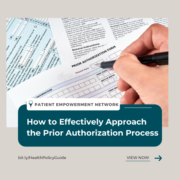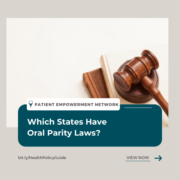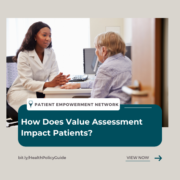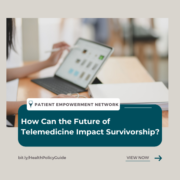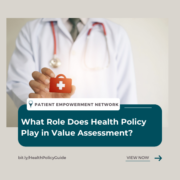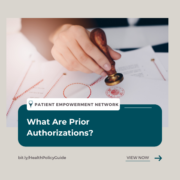How to Effectively Approach the Prior Authorization Process
How to Effectively Approach the Prior Authorization Process from Patient Empowerment Network on Vimeo.
The prior authorization process can be a daunting one and often time-consuming. Joanna Morales, Esq, CEO of Triage Cancer shares how to make this process easier for patients and their loved ones and explains the appeal process you’d go through if your prior authorizations ever were denied.
See More from the Health Policy Activity Guide
Transcript
Diahanna Vallentine:
So prior authorizations can be time-consuming and lead to delays in treatment, is there any way for patients and their loved ones to speed up the process of getting this taken care of?
Joanna Morales: I think being proactive, unfortunately, it puts one more things on the patient to have to do to get access to care, but proactively having conversations with your healthcare team to see if they’re going to fill out the prior authorization or if it’s something that you need to do, or if you need to contact the insurance company and find out if you actually need the prior authorization. So, if you’re proactive and you’re communicating effectively with your healthcare team and the insurance company, it will speed up the process to get access to that prior authorization.
Diahanna Vallentine:
So, let’s just say you did all of that, and then you come back and that prior authorization for that treatment is denied. What can you do when the insurance company denies coverage for your care?
Joanna Morales:
Well, it’s definitely important that people don’t take no for an answer, and unfortunately most people do. We kind of assume that insurance companies are accurate when they tell us that they’re not going to cover something, but we have the right to appeal that decision, and if we actually appeal these decisions, we are much more likely to get access to the care that is being prescribed to us by our healthcare team.
Diahanna Vallentine:
Was there any other things when it goes to prior authorizations that patients should know that helps speed things up, whether it’s working through their treatment team, or can they request a particular person to talk to on the phone when they call their insurance companies that may help?
Joanna Morales:
I think when dealing with prior authorizations, patients can be proactive in communicating with their insurance company about the care that they’re going to receive, and that can include asking if there is a list of when a prior authorization is required for different types of medical care, but you could also potentially ask if there is a case manager at your insurance company who could be your recurring point of contact at the insurance company to help guide you through the treatment that you’re receiving and their coverage of that treatment. But it is important to realize that that case manager works for the insurance company, they don’t work for you, they can be very helpful in providing pieces of information, but it is important just to keep in mind that your case manager might be providing information, but you might still get denied for the care that you’re receiving, and then to know what your rights are with respect to appeals can be really useful.
Diahanna Vallentine:
Okay, so once you go through the external appeal and the general appeal is denied, can you still appeal that or is that a final decision?
Joanna Morales:
Generally, and every state’s rules are slightly different once you’ve received a denial in the external appeals process, that is the final say. Some insurance companies have multiple levels of internal appeals before you get to an external appeal, so usually once the external appeal has been decided, that’s the final decision.

